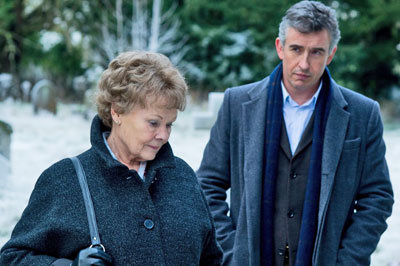Dame Judi Dench plays the title role in “Philomena,” a film “inspired by true events” opening Nov. 27 at Ritz. Philomena Lee is a working-class Irish woman who was sent to a convent as a pregnant teen. Her young son is suddenly taken away from her when he is adopted by an American couple. Now, 50 years later, Philomena enlists the aid of Martin Sixsmith (Steve Coogan, who co-wrote the screenplay), a disgraced journalist, to find the child she never knew.
Martin has agreed to perform this service as he is writing a “human-interest” story on Philomena. However, this Oscar-baiting film is only mildly interesting for the first hour as the odd couple seeks answers to the questions raised about Philomena’s son’s identity. The mystery becomes engaging only when (not because) the film introduces a queer twist.
One of the problems with “Philomena” is that it is not very subtle in its depiction of the two main characters. Martin is snobbish, champagne to romance-novel reader Philomena’s diluted Bucks Fizz. He is rude where she is polite. Martin makes things happen; Philomena is not particularly savvy with how the world works. They rub each other the wrong way, and eventually rub off on each other. Thankfully, there are a few graceful moments in the film’s end that show how the characters have transformed as a result of their experiences together.
While Dench often plays elegant, smart ladies, in “Philomena” she plays against type. Her unsophisticated character shocks Martin by saying the word “clitoris,” knowing what a gay man’s “beard” is and wanting to watch Martin Lawrence cross-dressing in “Big Momma’s House 2” on the American hotel TV. Viewers amused by the estimable actress making all of this sound convincing will perhaps enjoy “Philomena,” but really, it is as dreadful as it sounds. Coogan’s Martin tries to contain his exasperation, and some viewers may find themselves doing the same thing.
Dench does have a few strong moments. Reflecting back on her quickie romance that produced her son, Philomena admits that the sex, however sinful it was, was amazing. The regret and joy in her voice register clearly. Similarly, her reactions to various bits of news about her son are quite poignant.
The storytelling, however, seems to underscore many of the emotional moments for heightened effect. Director Stephen Frears insists on creating high melodrama in the sequence of Philomena’s child being taken from her. The syrupy music swells as mother is prevented from saying goodbye to her son. He looks out the car’s back window … This cliché moment never achieves the emotional payoff Frears intends. Likewise, when Philomena returns to the convent and the window and gate where she last saw her son, the “haunted by the awful past” feeling seems contrived.
As “Philomena” wends its way from Ireland to the U.S. and through a variety of characters that lead the investigative pair to some truths, Martin and Philomena discuss their beliefs in God and sin. But the passion they exude in these exchanges feels forced. Both performers are very good actors, and yet their chemistry does not quite work here. It may be because Dench is capital-A Acting in her role, exaggerating Philomena’s quirks, like enjoying the little squares of toast — croutons, the sophisticated Martin would call them — at the salad bar.
What both the film and Dench do get right is the regret that Philomena has about burying her experience in the convent and keeping the memory of her son a secret for 50 years. The actor duly conveys the inner pain of her life. When she struggles with the decision to go public with her story by having Martin publish it, there is real anxiety there. The film needs more emotional scenes like this, as when Philomena performs an act that is surprisingly powerful and oddly transcendent in the film’s end.
Suddenly, in its closing moments, “Philomena” becomes a redemption tale, and this actually has the effect of redeeming the film despite its many flaws. It is just a shame Frears took so long to reach such an inspired moment.
In the meantime, there are some curious issues raised, albeit briefly, about what constitutes a family. But most of the film is spent showcasing the odd-couple antics of Dench and Coogan. The performers are a valid reason to see “Philomena” — though one can wait for it to play on cable — and Coogan is a much better actor here than he is a screenwriter. The story itself is ultimately quite compelling. If only it had been told better.
